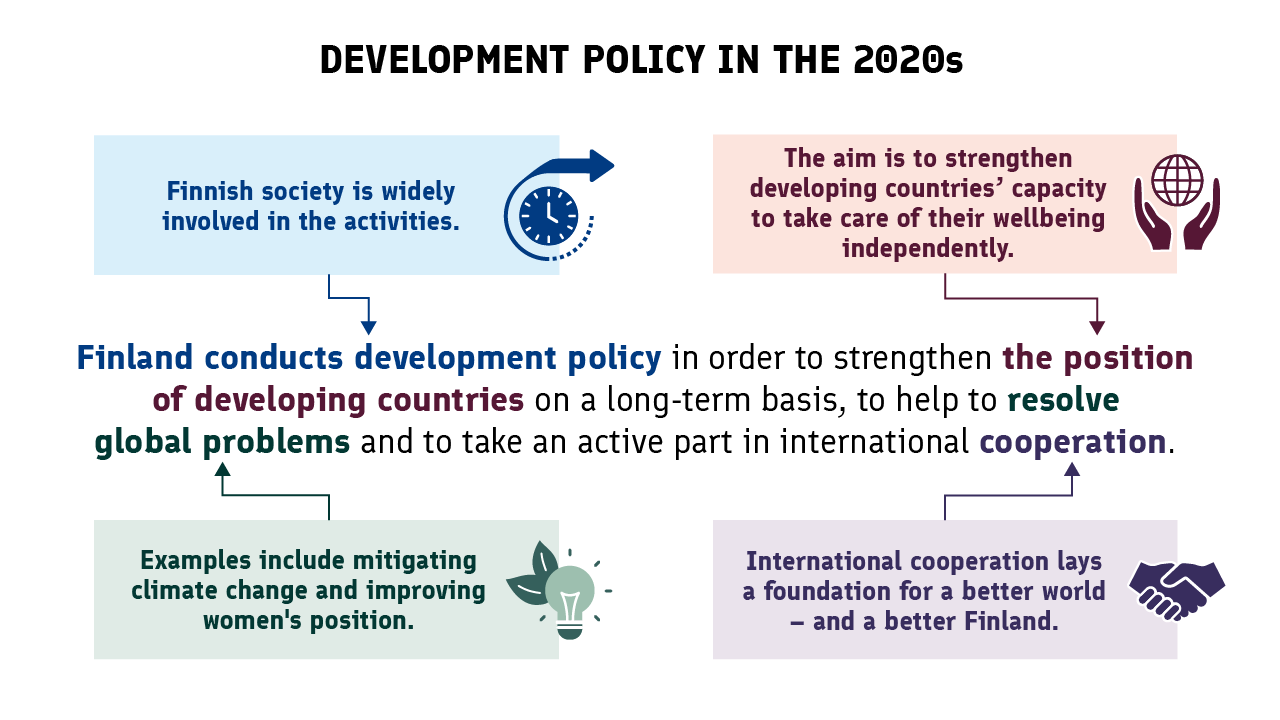Goals and principles of Finland’s development policy
Development policy is an integral part of Finland's foreign and security policy. Through development policy, Finland strengthens the position of developing countries on a long-term basis, helps in resolving global problems and takes an active part in international cooperation.
Development policy aims to eradicate poverty, reduce inequality and achieve sustainable development
Finland’s development policy promotes the worldwide goal aiming at sustainable poverty reduction and the realisation of fundamental rights, the rules-based multilateral system, and the Sustainable Development Goals (SDGs) adopted in the UN. Development policy is an integral part of Finland's human rights-based and value-based foreign and security policy. Finland's international cooperation and actions are grounded in the Paris Agreement on Climate Change (Link to another website.) and the goals of the 2030 Agenda for Sustainable Development(Link to another website.).
The cross-cutting objectives that Finland promotes through its development policy include gender equality, non-discrimination, climate-resilient and low-emission development as well as environmental protection, with an emphasis on safeguarding biodiversity.
Development cooperation is one way to implement development policy. It involves practical cooperation with developing countries and such other partners as the UN and civil society organisations in order to achieve the development goals. The objective of Finland’s development cooperation is to strengthen developing countries’ own carrying capacity. It is of key importance that the countries assume responsibility for their own development.
Finland channels its contribution to international climate funding(Link to another website.) as part of the exclusive official development assistance (ODA) administered by the Foreign Ministry.
Humanitarian assistance (Link to another website.) is an independent part of Finland's development policy. Humanitarian assistance is needs-based. Finland's humanitarian work is grounded on international humanitarian law, human rights treaties and refugee law, as well as on such humanitarian principles established by the United Nations as humanity, impartiality, neutrality and independence.
The Government Report on Development Policy across Parliamentary Terms(Link to another website.) confirms Finland's commitment to long-term development policy. A parliamentary monitoring group representing all parliamentary parties participated in the preparation of the report, which was adopted by the Government in 2021. A broad range of different actors in society were consulted during the process.
Finland engages in efforts to resolve major global problems and bears its responsibility through development cooperation, humanitarian assistance and contributions to international climate finance. A prosperous, more stable and more equitable world is in Finland’s best interest, too.

Effective development cooperation focuses on the priorities built on Finland's values and strengths
Finland’s development policy and development cooperation lead to concrete results that have a positive impact on the development of societies and on people's lives. Finland takes a long-term perspective on development cooperation, focusing on five priorities building on its values and strengths:
Strengthening the status and rights of women and girls(Link to another website.), with an emphasis on sexual and reproductive health and rights.
Education(Link to another website.), especially the quality of education, participation of persons with disabilities, and gender equality.
Sustainable economy and decent work(Link to another website.), especially innovations, the role of women in the economy and female entrepreneurship.
Peaceful and democratic societies(Link to another website.), especially the development of tax systems in developing countries, and support for democracy and the rule of law.
Climate change and natural resources(Link to another website.), with an emphasis on strengthening adaptation alongside mitigation of climate change; food security and water; meteorology and disaster risk prevention; forests and safeguarding biodiversity.
Diverse forms of development cooperation with a geographical focus on Africa
The geographical focus of Finland’s development cooperation is Africa, and cooperation is carried out mainly with the least developed countries. In terms of geography, the poorest areas are in sub-Saharan Africa, in parts of the Middle East, and in southern Asia. It is estimated that in 2030, as many as two thirds of the world’s poorest people will live in fragile countries or countries affected by conflict and violence. Issues concerning fragile states will continue to be an important development policy concern and a part of Finland's foreign and security policy.
Bilateral development cooperation(Link to another website.) is collaboration between Finland and individual developing countries. It is based on the partner countries' own development plans and on dialogue with them. The responsibility for effecting change lies with the partner countries. Finland supports their development.
The European Union, together with its Member States, is the world's largest donor of development and humanitarian assistance. Finland will continue to exert strong and consistent influence on EU development policy(Link to another website.) and on EU institutions in line with its development policy priorities. Development policy is an integral part of the EU's external relations and its role as a global actor. The EU's development policy must support the objectives of the EU's Common Foreign and Security Policy.
Multilateral development cooperation(Link to another website.), for example through the UN and development finance institutions, offers Finland an important channel of influence when it comes to targeting development finance and efforts to improve conditions in developing countries. In accordance with Finland's foreign policy priorities, the role of multilateral cooperation is emphasised, as the multilateral system faces multiple challenges.
Civil society(Link to another website.) plays a key role in achieving the objectives of development policy. Finland’s development policy strengthens the state and operating conditions of civil societies.
Private investments, technology and innovations should be harnessed to help in achieving the goals of sustainable development and the objectives of the Paris Agreement on Climate Change. In its development cooperation, Finland makes use of programmes and forms of financing based on private partnerships(Link to another website.). Research, cooperation with universities and inter-institutional cooperation(Link to another website.) are also supported.
Development policy investments(Link to another website.) are used for loan- and investment-based activities. Funding is expected to produce results.
Improving the efficiency and effectiveness of development cooperation
The development of results-based management, processes, quality and risk management in development cooperation is a continuous process. In recent years, the Ministry for Foreign Affairs has reformed its results-based management system. (Link to another website.)Results-based management tools(Link to another website.) are in use, and the Ministry for Foreign Affairs draws up an extensive Development Policy Results Report once every government term. The most recent report was submitted to Parliament in autumn 2022.(Link to another website.)
The need for cooperation is often the greatest in the most difficult operating environments – in countries with weak governance and regions where people live in extreme poverty and corruption is a major problem. Therefore, risk management(Link to another website.) is an important part of the management system of Finland’s development cooperation.
To prevent risks, attention is paid to planning, careful selection of partners and assessment of projects. Monitoring, reporting, evaluation and oversight(Link to another website.) are means to ensure that the funding allocated for development cooperation produces the planned results and that possible misuses of funds are detected. All Foreign Service employees, units and departments are responsible for oversight and risk management when it comes to development cooperation. Besides the oversight conducted by the Ministry for Foreign Affairs, many external operators(Link to another website.) monitor the use of funding and the fulfilment of the set targets.
Key principles guiding us towards sustainable results
1. Human rights: In its development policy, Finland follows the human rights-based approach. According to the UN Universal Declaration of Human Rights, all human beings are born free and equal in dignity and rights. The implementation of human rights is a key objective in development policy. The aim is to strengthen people’s ability to identify, demand and fulfil their rights and to enhance the ability of the authorities to respect, promote and protect human rights and safeguard their implementation.
2. Transparency: Effective and responsible development cooperation requires that both donors and recipients share information openly. Citizens and the media in both developing countries and donor countries have the right to know where and how public funds are spent. Transparency reduces the possibility of misuse of funds.
OpenAid.fi(Link to another website.) is a website of data and statistics on where, how and when Finland’s development cooperation funds are used. In addition, the Ministry for Foreign Affairs publishes funding decisions concerning development cooperation projects and programmes(Link to another website.) and evaluations of activities(Link to another website.) on its website. The Ministry for Foreign Affairs has introduced an online system, where anyone can report suspicions of misuse of development cooperation funds(Link to another website.).
3. Coherence: Development cooperation is just one instrument to effect change. Different policy sectors should engage in policy coherence for development to ensure the creation of preconditions for sustainable development in developing countries. Decision-makers in different policy sectors must take into account and assess the impacts of their actions on developing countries, and one policy sector must not impair the achievements reached in another sector.
Finland has promoted policy coherence especially in the following areas: food security, trade, migration, taxation and security. Concrete measures at the national level have included closer cooperation in central government and better coordination of EU affairs.
4. Quality and sustainable results: As part of the international donor community and together with partner countries, Finland is committed to improving the quality of development cooperation. The jointly agreed principles emphasise, among other things, cooperation between donors, strengthening partner countries’ expertise in local matters, harmonising practices, and transparency and mutual accountability.
We focus on achieving sustainable results that have positive long-term results on society. These show, for example, in improved health, education, employment, human rights and security.
At the administrative level, Finland lays an emphasis on more goal-oriented planning and results-based management, monitoring and evaluation of results, as well as learning from results and communicating about them.
5. Partner countries’ responsibility for their own development: Finland’s development cooperation is based on the development needs defined by the partner countries and their own development plans. Sustainable results are built on partner countries’ ownership of and commitment to the development goals. The responsibility for change rests with the partner countries – Finland supports their development.


